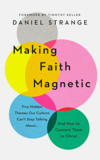
The following is an adapted extract from Timothy Keller’s foreword to Making Faith Magnetic.
Dan Strange has written another terrific, down-to-earth book to help believers engage in fruitful conversations with friends about faith.
In an earlier book, Plugged In, Dan outlines a way to “enter” another person’s framework of beliefs about life, then to “explore” and “expose”—that is, to both affirm and yet challenge them—and finally to redirect their good aspirations away from idols toward Christ himself. This approach, called “subversive fulfillment,” is the essence of good apologetics in a post-Christian, post-modern society.
In the present book, Dan briefly recaps the “subversive fulfillment” method, but his burden here is to show how this approach plays out specifically in five areas of human longing and need. Using the work of J.H. Bavinck, he argues that there are five fundamental things for which all human beings are searching and to which all of us are inevitably drawn “magnetically”.
The five points are:
While Bavinck the missionary applied these “magnetic points” to the world religions, Dan helps us apply them to secular people, but that presents a challenge.
“With their ‘heads’ secular people declare that there is no larger transcendent realm to contact… Yet Dan shows that the ways secular people live, speak, and struggle reveal that they know better in their hearts.”
As he notes in passing, some have wondered if secularism eliminates these magnetic points. After all, the agnostic or atheist does not believe in any higher power. And in key ways secular culture resists the other four points as well. It tells us to not find our identity by “fitting in” but by looking inside and defining ourselves. It tells us there are no true “norms” or moral absolutes for human life. It insists that we don’t need anything to “fix” us—that we can fix and fulfill ourselves through self-realization. And it asserts that we are already free to live any way we want as long as we do not harm anyone. In all these ways secularism seems to refuse to pose the questions that the religions of the world are answering.
But in this case appearances are highly deceiving. With their “heads” secular people declare that there is no larger spiritual whole to fit into or transcendent realm to contact—that there are no moral absolutes, inner “God-shaped” empty spaces, or divine plans. Yet Dan shows that the ways secular people live, speak, and struggle reveal that they know better in their hearts. They are seeking these things—indeed they are assuming their existence—despite their protestations to the contrary.
To make this case to a secular friend requires great patience, gentleness and love, and a lot of time. But in each area Dan gives readers many cultural examples of these secular-yet- spiritual aspirations that will resonate. He provides tons of pointers on how to tease out and make visible the operation of these magnetic points in our lives.

How to talk about Jesus in a way that connects with modern culture.
Finally Dan turns to how Jesus fulfills each of these universal human longings in ways no other world religion can match.
Jesus gives us an identity that connects us rather than isolating us. He is the only one who can provide a moral norm (his own character) that doesn’t descend into moralism. He alone brings a finished, accomplished deliverance rather than one we must perform for ourselves. He is the one thing you can live for that does not enslave but actually liberates you.
And he is the Higher Power, the High and Holy One—who became a human being we can know and love personally.
This little book edified me. It made me keep asking: “How shall we escape if we neglect so great a salvation?” (Hebrews 2 v 3, ESV).
Thanks to Dan Strange for writing this! Read it to appreciate your own salvation and in order to better recommend it to those you love.
In Making Faith Magnetic, Dr. Daniel Strange reveals five recurring themes that our culture can’t stop talking about, or, as he puts it, the “five permanent ‘itches’ that in our work, rest, and play, we have to vigorously scratch.” From TV to books to social media, these are the questions we can't stop asking and the tensions we can't stop wrestling with—and Jesus speaks powerfully into each one.